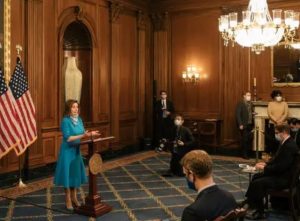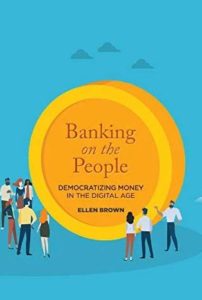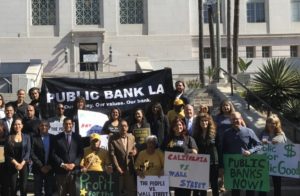Podcast: Play in new window | Download
USPS Crisis During Pandemic
During the COVID-19 pandemic, U.S. postal workers have been considered essential workers who continue to perform their jobs. Yet the Postal Service is in imminent danger of shutting down entirely due to lack of funding. A permanent shutdown of this quasi-government agency would leave hundreds of thousands out of work, and threaten privatization of a beloved and venerable institution.
The nation relies on the delivery of critical goods and services that mail service allows, including life-saving medications. More than one billion prescription drugs were shipped last year alone. And in rural areas, millions of Americans rely on the Postal Service to deliver essential goods.
When President Donald Trump signed into law a $2 trillion coronavirus emergency spending bill, it allowed USPS to borrow a mere $10 billion from the Treasury Department. Fredric V. Rolando, president of the National Association of Letter Carriers, called this “woefully inadequate,” and said, the administration clearly does not understand the importance of the Postal Service, especially now. Trump has said that the administration won’t approve the $10 billion loan if the postal service doesn’t quote, “take his advice” to raise package and shipping rates “approximately four times.”
Postmaster General Megan Brennan recently warned members of the House Oversight Reform Committee that “the sudden drop in mail volumes, our most profitable revenue stream, is steep and may never fully recover.
Help save the USPS – USMailIsNotForSale.org / NationalRuralOrganizing
The Postal Service is the most popular federal agency among the public. In a recent Pew Research poll, more than 91% of respondents said they have a favorable opinion of USPS. That rating is higher than the CDC or the Census Bureau.
Guest – Chuck Zlatkin. Chuck is the legislative director of the New York Metro Area Postal Union.
—-
Banking On The People: Ellen Brown
So far President Donald Trump and Congress have authorized $6 trillion to be given out in effort to stem an ongoing economic depression. One trillion is 1000 billion dollars and $1 billion is 1000 million dollars. There are so many zeros in $6 trillion that the number when written down stretches from one side of the page to the other. Six trillion if divided up and given to each American worker would mean that each one of them would have gotten tens of thousands of dollars. But instead most of the money went to the hedge funds, banks, and big corporations.
The average American got very little. Small businesses got very little and are now pressured to open up. State and municipal governments received very little. Millions of people got nothing at all.
Under the bailout legislation, money could go to finance public banks. These funds could be used to finance a better society, particularly a green new deal. Public banks could be like a utility operating on the principal of doing public good.
Guest – Attorney and economist Ellen Brown who has written 13 books on economics and is the founder of The Public Banking Institute. We will be speaking about the COVID-19 bailouts and how they will betray Americans just as the 2008 stimulus aid did. Ellen Brown is the cohost of a radio program on The progressive radio network, prn.fm, called It’s Our Money.
—————————–
—————————–




